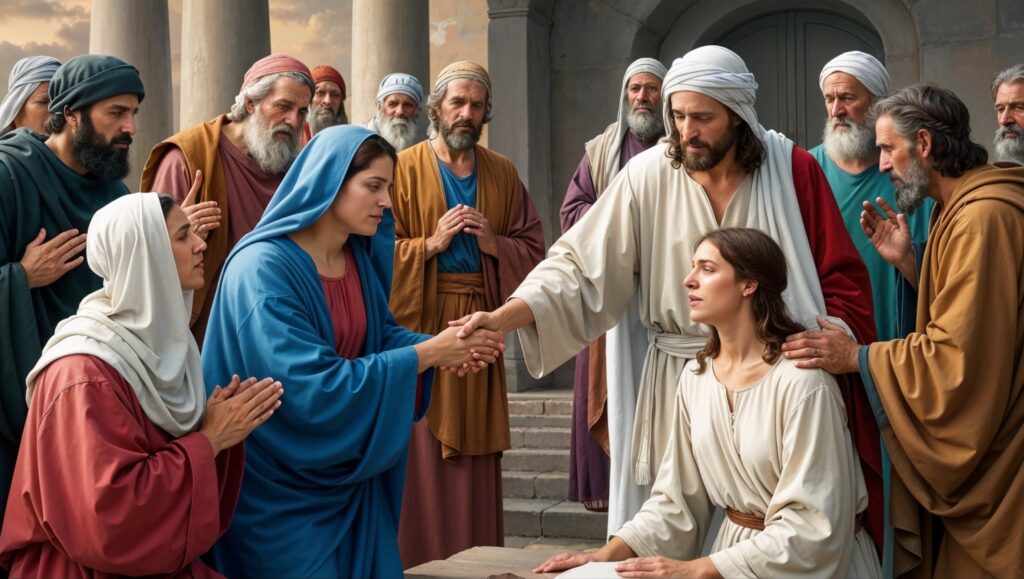Life is a tapestry of highs and lows, woven with threads of joy and sorrow. There are days when the sun shines brightly on our spirits, and others when clouds of despair seem to blot out all light. Psalm 42:5-6 speaks directly to the heart of those shadowed moments, offering a timeless reminder that hope in God is the anchor for our souls amid life’s storms.
Psalm 42:5-6 King James Version
5 Why art thou cast down, O my soul? and why art thou disquieted in me? hope thou in God: for I shall yet praise him for the help of his countenance.
6 O my God, my soul is cast down within me: therefore will I remember thee from the land of Jordan, and of the Hermonites, from the hill Mizar.
The Cry of the Downcast Soul
The psalmist begins with a deeply personal question: “Why, my soul, are you downcast? Why so disturbed within me?” This is not a detached observation but a heartfelt cry from someone grappling with inner turmoil. The psalmist feels the weight of spiritual desolation—his tears have been his food day and night (Psalm 42:3), and he is surrounded by voices questioning God’s presence in his life. These feelings are raw, relatable, and profoundly human.
Yet what stands out here is the psalmist’s response to his own despair. Instead of allowing his emotions to dominate him, he turns inward and speaks to his soul. This act of self-dialogue is a powerful spiritual tool. It shows us that faith does not ignore pain but confronts it head-on, reminding the heart of eternal truths even when circumstances seem overwhelming.
Hope as a Deliberate Choice
The psalmist’s declaration—“Put your hope in God, for I will yet praise Him”—is not merely wishful thinking; it is an act of defiance against despair. Hope in God is not dependent on external circumstances but on His unchanging nature as Savior and Redeemer. The word “yet” carries immense weight here—it reflects a confidence that praise will come again, even if it feels distant at the moment.
This kind of hope requires faith. It means trusting in what we cannot yet see (Hebrews 11:1) and believing that God’s plans for us are good, even when life feels anything but good. The psalmist models this trust by choosing to praise God in advance of deliverance. This kind of forward-looking faith shifts our focus from temporary struggles to the eternal promises of God.
The Power of Remembrance
In verse 6, the psalmist turns to memory as a source of strength: “My soul is downcast within me; therefore I will remember you.” He recalls past experiences of God’s faithfulness—moments when he felt God’s presence and provision. This act of remembering serves as a spiritual anchor, grounding him in truth when emotions threaten to sweep him away.
The mention of places like Mount Hermon and Mount Mizar evokes a longing for closeness with God. These geographical references likely symbolize moments or places where the psalmist experienced God’s nearness. Similarly, reflecting on our own history with God—times, when He carried us through trials or answered prayers—, can reignite our faith during seasons of doubt.
Practical Lessons for Today
Psalm 42 offers profound insights into navigating spiritual discouragement:
- Acknowledge Your Feelings
The psalmist does not shy away from admitting his despair. Likewise, we must bring our honest emotions before God, knowing He welcomes our transparency. - Speak Truth Over Your Emotions
When negative thoughts arise, counter them with Scripture and reminders of God’s promises. Like the psalmist, preach hope to your soul. - Choose Hope Daily
Hope is not always a feeling—it is often a decision. Trusting in God’s goodness requires intentionality, especially when circumstances feel bleak. - Remember God’s Past Faithfulness
Recalling how God has worked in your life before can strengthen your faith for today’s challenges. - Praise Even in Pain
Worshipping God amid trials shifts your perspective from problems to His power. Declare His goodness even before you see resolution.
God’s Presence in Our Valleys
Psalm 42 reminds us that feeling distant from God does not mean He has abandoned us. Verse 8 beautifully reassures us: “By day the Lord directs his love, at night his song is with me—a prayer to the God of my life.” Even when we cannot sense Him, His steadfast love surrounds us like an unbroken melody.
Jesus echoes this same invitation for rest and hope in Matthew 11:28: “Come to me, all you who are weary and burdened, and I will give you rest.” Trusting in God means surrendering our burdens to Him and finding peace in His presence.
Read More About This Devotional
Words of Wisdom: Hope: Cultivating Confidence in God’s Plan
Quote of the Day: “There are moments when we must remain silent. We just need to let our faith in God speak and act for us”
Conclusion
Psalm 42:5-6 offers an enduring message for anyone walking through seasons of discouragement or spiritual dryness: place your hope in God. Speak truth over your soul, remember His faithfulness, and trust that He will lead you from despair to praise.
No matter how heavy your heart feels today or how distant God seems, know this—He is near to the brokenhearted (Psalm 34:18). He invites you to trust Him as your Savior and your God. In Him alone can we find the strength to say with confidence: “I will yet praise Him.”
Scripture Reading for the Day
Ecclesiastes 3 King James Version
1 To every thing there is a season, and a time to every purpose under the heaven:
2 A time to be born, and a time to die; a time to plant, and a time to pluck up that which is planted;
3 A time to kill, and a time to heal; a time to break down, and a time to build up;
4 A time to weep, and a time to laugh; a time to mourn, and a time to dance;
5 A time to cast away stones, and a time to gather stones together; a time to embrace, and a time to refrain from embracing;
6 A time to get, and a time to lose; a time to keep, and a time to cast away;
7 A time to rend, and a time to sew; a time to keep silence, and a time to speak;
8 A time to love, and a time to hate; a time of war, and a time of peace.
9 What profit hath he that worketh in that wherein he laboureth?
10 I have seen the travail, which God hath given to the sons of men to be exercised in it.
11 He hath made every thing beautiful in his time: also he hath set the world in their heart, so that no man can find out the work that God maketh from the beginning to the end.
12 I know that there is no good in them, but for a man to rejoice, and to do good in his life.
13 And also that every man should eat and drink, and enjoy the good of all his labour, it is the gift of God.
14 I know that, whatsoever God doeth, it shall be for ever: nothing can be put to it, nor any thing taken from it: and God doeth it, that men should fear before him.
15 That which hath been is now; and that which is to be hath already been; and God requireth that which is past.
16 And moreover I saw under the sun the place of judgment, that wickedness was there; and the place of righteousness, that iniquity was there.
17 I said in mine heart, God shall judge the righteous and the wicked: for there is a time there for every purpose and for every work.
18 I said in mine heart concerning the estate of the sons of men, that God might manifest them, and that they might see that they themselves are beasts.
19 For that which befalleth the sons of men befalleth beasts; even one thing befalleth them: as the one dieth, so dieth the other; yea, they have all one breath; so that a man hath no preeminence above a beast: for all is vanity.
20 All go unto one place; all are of the dust, and all turn to dust again.
21 Who knoweth the spirit of man that goeth upward, and the spirit of the beast that goeth downward to the earth?
22 Wherefore I perceive that there is nothing better, than that a man should rejoice in his own works; for that is his portion: for who shall bring him to see what shall be after him?



